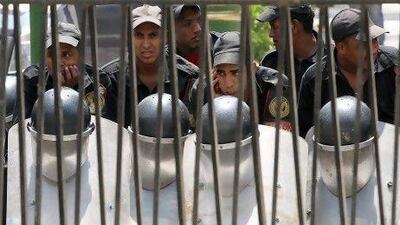CAIRO // The Muslim Brotherhood was escalating a confrontation with Egypt's military rulers last night by sponsoring a protest with thousands of demonstrators in Tahrir Square against what many revolutionary groups have described as a military "coup".
With Mohammed Morsi, the chairman of the Muslim Brotherhood's Freedom and Justice Party, declaring himself the winner of presidential elections, the group was mounting a more ambitious resistance to the Supreme Council of the Armed Forces's (Scaf) last-minute legal manoeuvres to consolidate power and strip the executive branch of many of its roles. The Brotherhood has rarely taken to the streets over the 16 months, instead focusing on winning elections.
After a ruling from the Supreme Constitutional Court (SCC) last Thursday that one third of parliamentary elections were unconstitutional, the Scaf dissolved parliament, and gave itself full legislative powers and control over a body that will rewrite the constitution.
Top generals have attempted to gloss over the move, claiming they were simply implementing a verdict from the country's highest court. In a news conference on Monday, Major General Mamdouh Shahin said the decrees were just "provisional measures" taken out of necessity and urged Egyptians to trust the military's commitment to hand over power to an elected government.
The Muslim Brotherhood was joined last night by several revolutionary groups, some of them with contrasting ideologies, such as the secularist April 6th movement that endorsed Mr Morsi's campaign before the elections on Saturday and Sunday. There were chants of "down with military rule", but no violent incidents were reported by late evening.
Earlier in the day, a small group of legislators made symbolic attempts to enter parliament, but were met by a locked gate and a line of anti-riot soldiers on the other side.
Analysts said that the Muslim Brotherhood and the Scaf were ultimately fighting over the "big prize": the writing of a new constitution. Despite the group's electoral victories, it has been blocked from implementing initiatives by the military through wide powers the Scaf awarded itself through a constitutional declaration and amendments enacted after Hosni Mubarak stepped down from power amid a huge uprising last year.
"The big prize for all sides is what the new constitution will say," said Michele Dunne, the director of the Rafik Hariri Centre for the Middle East at the Washington DC-based Atlantic Council. "It will answer questions over what role the president will play versus the parliament, the military versus civilian powers."
A constitutional commission was appointed before the Supreme Constitutional Court's ruling, but it was still unclear whether it would continue as planned, or whether a new committee would be appointed by the Scaf.
Citing legal precedents, the Muslim Brotherhood, whose Freedom and Justice Party had controlled nearly half of the seats in parliament, has said that dissolving parliament was itself unconstitutional without a nationwide referendum vote.
The group also criticised a set of amendments to the Scaf's constitutional declaration that restricted the presidency to vetoing laws and appointing the cabinet, while giving the generals full control over the military's operations, legislative power and authority over a committee that will rewrite the country's 1971 charter.
The dissolving of parliament and the Scaf's power grab have upended Egypt's democratic transition and erased many of the electoral victories during the past year. The military had pledged to hand over full power to a civilian government at the end of the month, but that transition is now expected to stretch on for at least six more months, if not longer.
The Carter Centre, a US group that monitored elections, yesterday said that the Scaf's moves were "troubling" because power would not be fully transferred from an unelected military body. It also said the military should not interfere in the writing of the constitution.
Even the results of the presidential elections are uncertain. The campaign of the former prime minister Ahmed Shafiq, Mr Morsi's opponent, yesterday was still insisting that Mr Shafiq had won the race.
While individual polling station results tabulated by local newspapers have confirmed Mr Morsi's victory claim, the winning margin was just 900,000 votes. Together with possible appeals and allegations of voter manipulation, Egyptians were bracing themselves for more head-spinning developments. Final results are scheduled to be announced by the Supreme Presidential Election Commission tomorrow.
Mr Morsi's apparent success in the presidential elections, however, has proven that the Muslim Brotherhood remains one of the most powerful political groups in post-Mubarak Egypt.
The group has exhibited strong party discipline over the last year, refusing to take part in most of the protests against the military and remnants of the old regime. Instead, it mobilised its network of members and supporters across the country to win elections based on a "renaissance" project for Egypt that would restore the economy and spread wealth more equally. They have also portrayed themselves as a moderate Islamist group that will bring "justice and equality" to Egypt after decades of curtailed human rights and unaccountable government.

